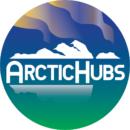Latest workshop to evolve the ArcticHubs research tools 🛠️
Taking advantage of an already strong participation of ArcticHubs researchers at Arctic Frontiers 2024, we doubled up to use the visit to additionally stage an interactive workshop to refine developments around two of our collaborative research tools – namely QMethod, and Social Licence to Operate (SLO) beyond the mining sector. In addition to Arctic Frontiers, the Norwegian Arctic city of Tromsø also hosts three of our consortium organisations (NORCE, NOFIMA, …
